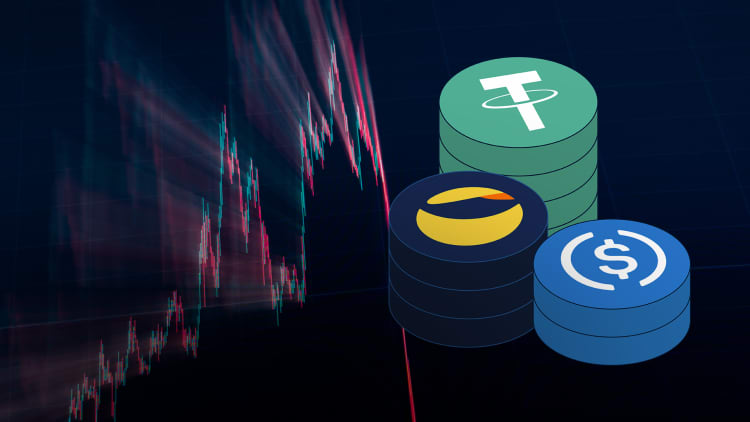Launched in 2018 by crypto firm Circle, USDC is now the second-biggest stablecoin globally, with more than $30 billion worth of tokens in circulation.
Nurphoto | Getty Images
Cryptocurrency firm Circle said Monday it’s now registered as an electronic money institution, or EMI, in France, granting the firm a key license to become a compliant stablecoin issuer under the European Union’s tough crypto laws.
Circle, which is primarily known for its USD Coin, or USDC, stablecoin, said in a statement that it was granted an e-money license by France’s banking industry regulator, Autorite de Controle Prudentiel et de Resolution, or ACPR.
The license makes Circle the first global stablecoin issuer to achieve compliance with the European Union’s landmark Markets in Crypto-Assets (MiCA) regulatory framework, the company said.
Circle added that the approval will mean that both its USDC and Euro Coin, or EURC, tokens are now being issued in the EU in compliance with MiCA’s stablecoin regulatory obligations. The company said it is also opening up its Circle Mint, which allows businesses to mint and redeem Circle stablecoins, in France.
“Since our founding, Circle has sought to build durable, compliant, and well-regulated infrastructure for stablecoins,” Jeremy Allaire, co-founder and CEO of Circle, said in a statement Monday.
“Our adherence to MiCA, which represents one of the most comprehensive crypto regulatory regimes in the world, is a huge milestone in bringing digital currency into mainstream scale and acceptance,” Allaire added.
Stablecoins are a type of cryptocurrency pegged to traditional assets, typically government-issued currencies such as the U.S. dollar. Investors hold them to avoid volatility seen in other cryptocurrencies like bitcoin.

They’re also a key way to trade in and out of cryptocurrencies quickly and that allows users to avoid having to rely on fiat currencies stored in bank accounts.
EU ushers in stablecoin rules
EU regulators last year passed the world’s first comprehensive law that governs how cryptocurrency companies should operate. The law outlines rules specifying ways companies should establish investor protections and make sure their platforms aren’t vulnerable to manipulation.
The law, known as the Markets in Crypto-Assets, or MiCA, officially entered into force in May 2023.
However, provisions governing stablecoins were approved only last week. These measures were viewed as particularly stringent, as they imposed limitations on how much trading could be done in certain stablecoins, particularly U.S.-denominated ones.

Under the rules, companies must stop issuing non-euro denominated stablecoins used as a “means of exchange” if they cross a threshold of more than 1 million transactions or a value of over 200 million euros ($215.2 million) per day, according to Article 23 of MiCA.
As a France-registered EMI, Circle said it is now able to offer its services — which includes the ability to mint and redeem USDC via Circle Mint — to customers not just in France, but throughout the European Union.
That’s because according to MiCA, crypto businesses are able to offer their services in one EU country and “passport” them out into other markets within the bloc.
The remaining obligations set out under MiCA, which concern crypto asset service providers, will become applicable by December 30, 2024. After that point, crypto companies will have until July 2026 to become fully compliant with MiCA.
Launched in September 2018 by Circle and crypto exchange Coinbase, USDC is now the second-biggest stablecoin globally, with $32.4 billion worth of tokens in circulation, according to CoinGecko data. It is second only to Tether’s USDT, the world’s largest stablecoin with $112.7 billion in circulation, according to CoinGecko.

